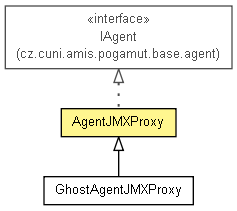 cz.cuni.amis.pogamut.base.agent.jmx.proxy.AgentJMXProxy
cz.cuni.amis.pogamut.base.agent.jmx.proxy.AgentJMXProxy
|
|||||||||
| PREV CLASS NEXT CLASS | FRAMES NO FRAMES | ||||||||
| SUMMARY: NESTED | FIELD | CONSTR | METHOD | DETAIL: FIELD | CONSTR | METHOD | ||||||||
java.lang.Objectcz.cuni.amis.pogamut.base.agent.jmx.proxy.AgentJMXProxy
public class AgentJMXProxy

Makes it possible to control agent running in remote JVM through JMX protocol.
| Constructor Summary | |
|---|---|
AgentJMXProxy(java.lang.String agentJmxAddress)
|
|
| Method Summary | |
|---|---|
protected java.lang.Object |
call(java.lang.String actionName)
|
protected java.lang.Object |
callNoException(java.lang.String actionName)
All exceptions are wrapped in RuntimeException. |
protected java.lang.Object |
callNoException(java.lang.String actionName,
java.lang.Object[] params,
java.lang.String[] sig)
All exceptions are wrapped in RuntimeException. |
protected java.lang.Object |
getAttributeNoException(java.lang.String atr)
|
IAgentId |
getComponentId()
Returns agent id - contains also a human-readable name that can be changed |
IComponentBus |
getEventBus()
IComponentBus that the instance is working with. |
Folder |
getIntrospection()
Returns folder with introspection information. |
java.util.logging.Logger |
getLog()
|
IAgentLogger |
getLogger()
Returns AgentLogger for the instance allowing creating new log categories or adding new handlers to them. |
protected javax.management.MBeanServerConnection |
getMBeanServerConnection()
|
java.lang.String |
getName()
Returns human-readable agent's name. |
javax.management.ObjectName |
getObjectName()
|
ImmutableFlag<IAgentState> |
getState()
Returns the state of the agent (whether it's running / dead / etc.). |
void |
kill()
Stops the agent (unconditionally), closing whatever connection it may have, this method must be non-blocking + interrupting all the communication, logic or whatever threads the agent may have. |
void |
pause()
This should pause the the agent. |
void |
resume()
This should resume the logic of the agent. |
void |
start()
Attempt to launch the agent. |
void |
startPaused()
Attempt to launch the agent. |
void |
stop()
Attempt to stop the agent, usually meaning dropping all running flags and see whether it will stop automatically. |
| Methods inherited from class java.lang.Object |
|---|
clone, equals, finalize, getClass, hashCode, notify, notifyAll, toString, wait, wait, wait |
| Constructor Detail |
|---|
public AgentJMXProxy(java.lang.String agentJmxAddress)
| Method Detail |
|---|
protected javax.management.MBeanServerConnection getMBeanServerConnection()
public javax.management.ObjectName getObjectName()
public IAgentLogger getLogger()
IAgent
getLogger in interface IAgentpublic java.util.logging.Logger getLog()
public ImmutableFlag<IAgentState> getState()
IAgentNote that the type AgentState wraps two things:
getState in interface IAgentprotected java.lang.Object callNoException(java.lang.String actionName)
actionName -
protected java.lang.Object callNoException(java.lang.String actionName,
java.lang.Object[] params,
java.lang.String[] sig)
actionName -
protected java.lang.Object call(java.lang.String actionName)
throws AgentException
AgentExceptionprotected java.lang.Object getAttributeNoException(java.lang.String atr)
public void start()
throws AgentException
IAgent
This method is not suitable for simultaneous start of multiple agents that should start working together in the environment.
(I.e., during tournaments of agents when you need to synchronize their start in the environment.) In such cases
use IAgent.startPaused() and then multiple threads+barrier to execute IAgent.resume() of all agents at once.
start in interface IAgentstart in interface IControllableAgentException
public void startPaused()
throws ComponentCantStartException
IAgent
In contrast with IAgent.start() this method will initialize the agent inside the environment but pauses
it after the start (i.e., its reasoning should not run, the action should not do any decisions).
To fully start the agent, you need to IAgent.resume() it.
It is designed to provide safe synchronization of multiple agent simulations when you need to start the reasoning of agents synchronously.
startPaused in interface IAgentComponentCantStartException
public void pause()
throws AgentException
IAgent
pause in interface IAgentAgentException
public void resume()
throws AgentException
IAgent
resume in interface IAgentAgentExceptionpublic void stop()
IAgentIf the stop can not complete - it must automatically call kill() method.
stop in interface IAgentstop in interface IControllablepublic void kill()
IAgentAfter calling kill() method, the only method that may be called is getState() to examine state of the agent.
This also equals to "exception happened outside the agent" and "IFatalErrorEvent should be propagated inside
the agent"
kill in interface IAgentkill in interface IControllablepublic IAgentId getComponentId()
IAgent
getComponentId in interface IAgentgetComponentId in interface IComponentpublic java.lang.String getName()
IAgentDo not use as unique id of the agent:
1) the name might change during the life of agent
2) we do not ensure it's unique
Use getComponentId().getToken() instead!
Use getComponentId().getName().setFlag() to change the name of the agent.
getName in interface IAgentpublic Folder getIntrospection()
IAgent
getIntrospection in interface IAgentpublic IComponentBus getEventBus()
IComponentAwareIComponentBus that the instance is working with.
Note that by design-choice - the IComponentBus is a singleton inside AgentScoped,
therefore you don't have to necessarily obtain the instance through the component, it suffice
to obtain it using injection into your object.
getEventBus in interface IComponentAware
|
|||||||||
| PREV CLASS NEXT CLASS | FRAMES NO FRAMES | ||||||||
| SUMMARY: NESTED | FIELD | CONSTR | METHOD | DETAIL: FIELD | CONSTR | METHOD | ||||||||